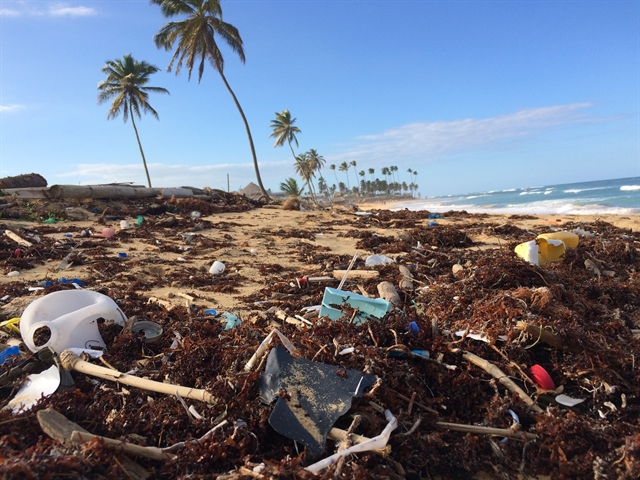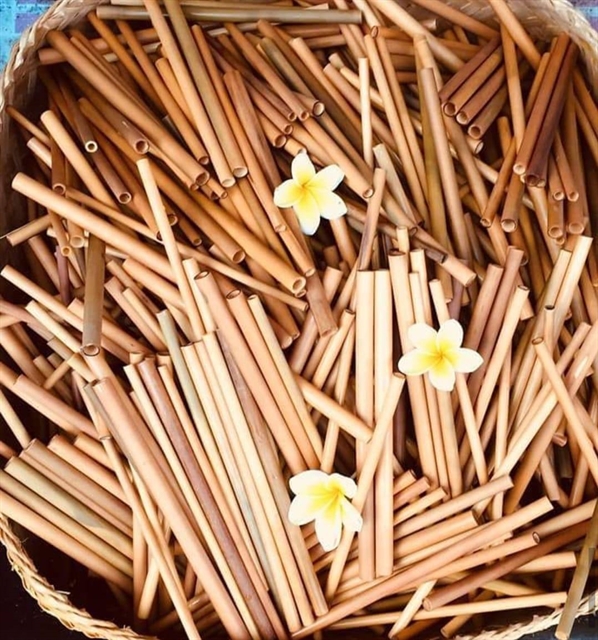 Society
Society

Waves of plastic wash up on beaches around the world. Rare turtles are found with straws jammed up their nostrils. The bellies of deep-diving whales are packed with bags and bottles. The scourge of plastic is choking the planet and Việt Nam is one of the worst offenders.

|
| Plastic waste finds its way to beaches around the world. VNS Photo Ollie Arci |
by Ollie Arci
Waves of plastic wash up on beaches around the world. Rare turtles are found with straws jammed up their nostrils. The bellies of deep-diving whales are packed with bags and bottles. The scourge of plastic is choking the planet and Việt Nam is one of the worst offenders.
Our consumption is a big part of the problem. The way we eat and the waste produced by every household is to blame for the growing mountain of trash. Items that will take centuries, if not millennia, to disappear.
It is hard to escape this detritus, with beauty spots tainted all over the country. Temples, pagodas and cultural sites aren’t immune from shiny plastic wrappers and drink bottles. Litter is now a part of the environment.
Every meal ordered is two or three plastic bags, a couple of containers, a set of plastic cutlery. The weekly shop adds up to more plastic bags, which will eventually end up littering the side of the road. Every coffee is a plastic lid and stirrer. It seems unstoppable.
As an avid user of food delivery services, I worry about my own contribution to the problem. A number of restaurants have started to package their orders in healthier materials, including biodegradable cardboard.
More posts are popping up about the use of bamboo or paper-based straws. These efforts are a good sign of change, but more work is certainly needed to turn back the plastic tidal wave.

|
| Bamboo straws are one way to change consumption habits. Photo Zero Waste Nation |
As a community, expats can play a big role in setting standards for our own behaviour. The activities of groups, such as Keep Hanoi Clean, demonstrate there is sufficient willpower among the expat community to make a difference.
This work can spread to advocating for the use of greener materials, negating the need to ‘clean up’ Hà Nội in the first place.
These kind of changes don’t come cheap – the switch to eco-friendly materials has its own cost and often requires vendors to increase their prices or take a hit on profits.
That’s why such steps need support. As an expat community we were all attracted to Việt Nam for various reasons, including perhaps its abundance of breathtaking natural beauty.
That natural beauty is under severe threat and if we want to continue living here and being proud of our home, urgent action is needed. The damage being done is extreme.
Recent news stories have shown some supermarkets using leaves to wrap vegetables instead of plastic, which is a great way of turning to nature to find alternative options for human needs. Not to say that wrapping veggies is an urgent need, but every little helps.
Businesses which do make the effort deserve to be rewarded with custom as they set an example for others to follow. As consumers we have the unique ability to direct funds in ways which either benefit or harm the greater society.
Although one set of take-away plastic seems insignificant in the grand scheme of waste, it’s a small piece of that pile that will exist for many years. If we instead choose eateries which provide alternatives, even if it costs us an extra few dollars, it sets a standard.
Soon enough you establish a baseline, at which all restaurants automatically choose to wrap their food in biodegradable materials. The outliers, those places which still use plastic, will be snubbed and eventually go out of business.
The expat community is close-knit and ideas like these spread quickly. The owners of many of the businesses are often our friends, as well as being big parts of the community, so can easily drum up support for such initiatives.
With the support of a passionate community, businesses which make the switch can succeed and thrive. We’ll feel less guilty about ordering dinner if it doesn’t contribute to the degradation of our home.
As I mentioned, small steps have already been made. In addition to the paper straws and compostable boxes, some places allow you to decline cutlery. However, to overhaul our use of plastic will need a concerted effort from all sections of society.
These kind of changes don’t happen overnight. We all have our part to play, and in choosing a better direction for our consumption we can establish better behaviours for the future. VNS




